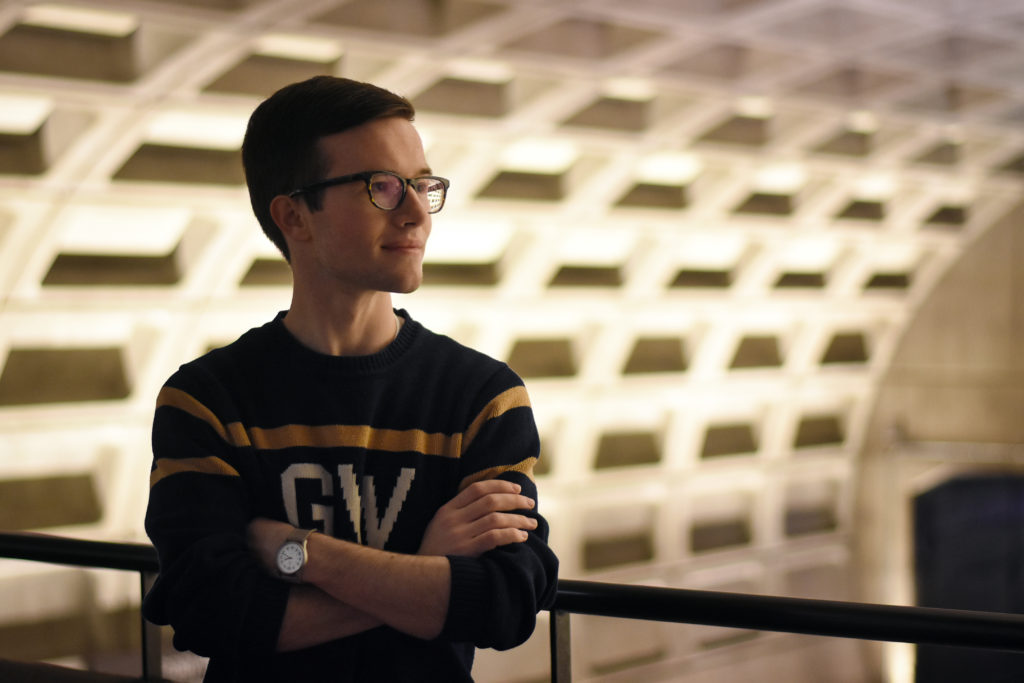Some students are reviving advocacy efforts to offer students discounted Metro rides.
Students are pushing both the Washington Metropolitan Area Transit Authority and GW to reach a deal allowing students to opt into the University Pass program, which gives students unlimited access to city buses and trains for $1 a day if their university purchases passes for the entire student body. Students said they hope to regain momentum on student advocacy work that fizzled out three years ago after officials declined to sign the entire University onto the program, which would tack on about $260 to each student’s tuition bill.
James Harnett, a junior and a Foggy Bottom and West End Advisory Neighborhood Commissioner, said he has been researching student transportation options for the past three months and is now pushing WMATA to allow individual students to join the UPass program.
Harnett said he testified at a WMATA hearing last Tuesday to offer UPass to students with an opt-out option for those who do not want to pay the extra $260 each school year. He said the proposal, which he advocated to include in WMATA’s fiscal year 2020 budget, would lower student transportation costs for individuals who travel to internships, jobs and events around the District.
“I think it is going to help students feel more financially secure,” Harnett said. “It is also going to make them feel that the city is accessible overall.”
Offering discounted Metro fare to all students has long been an ongoing conversation at GW. In 2016, officials considered but then rejected a proposal to offer UPass to students. About three-quarters of the student body indicated that they supported the pass in a Student Association referendum that year, but administrators said at the time that tacking an extra $250 onto all students’ tuition bills would not be “feasible or fair.”
Detrick Campbell, a master’s degree student and an ANC commissioner, said he is working with Harnett and is also looking for other resources that could help cut transportation costs, like expanding KACIF Travel grants, which reimburse public transportation costs for students with unpaid internships. He said offering UPass to all students would “improve GW culture” by increasing affordability.
“GW should make available as many resources to ensure that their students can succeed not only as students, but as leaders and active members of society as well,” Campbell said in an email.
University spokeswoman Maralee Csellar said GW is “willing” to negotiate a “mutually beneficial” program with WMATA in which interested students could decide whether to use the UPass program.
“The current inflexibility of a mandatory program for all students makes it unrealistic for us to implement at this time,” Csellar said in an email.
WMATA spokesman Ron Holzer said an opt-out model is currently “not under consideration” because the program’s “deep discount” is only profitable for Metro if the entire University participates.
“We understand GW’s concern about the mandatory nature of the UPass program because it doesn’t necessarily benefit all students,” Holzer said in an email. “However, without that feature, it is not a viable program for Metro.”
SA Sen. Vaibhav Vijay, CCAS-U, has also been advocating to implement the UPass system, which is currently available at some other D.C. schools including American University. The SA and the GW Roosevelt Institute worked together to send out a survey to students to gauge interest in the program earlier this semester.
The survey asks how often students use the Metro, why they use it and how much they spend on it.
“We will likely explore more avenues through which to share the Google Form as well, but this form is basically just a way to dip our toes in the water,” Vijay said in an email.
Sarah Crowley, a member of the GW Roosevelt Institute who is leading a working group on UPass, said students have been working for the past semester in the hopes of starting conversations about UPass between administrators and WMATA officials. She said students at GW with internships, jobs or volunteer work off campus could benefit “tremendously” from UPass, adding that the program would contribute to University President Thomas LeBlanc’s goal of promoting a service-oriented community.
“Service-oriented community doesn’t just mean service at Foggy Bottom,” Crowley said. “It means service all over D.C. We need to integrate ourselves into the D.C. community.”
The GW Roosevelt Institute is also hosting a panel discussion Monday covering D.C.’s transportation system.
Sydney Nelson, the former executive vice president of the SA, said UPass advocacy efforts two years ago helped the SA recognize that a University-wide subscription to UPass would be an “anti-affordability” measure since most students have indicated that they spend less than $200 on the Metro each semester. But as the desire for affordable student transportation persists, Nelson said there is “room for conversation” on the topic.
“From a student perspective, it’s hard to advocate for the UPass because you’re either trying to push the University to accept the deal that doesn’t benefit students or you’re trying to get WMATA to back off kind of what’s the financial incentive for them,” Nelson said.




